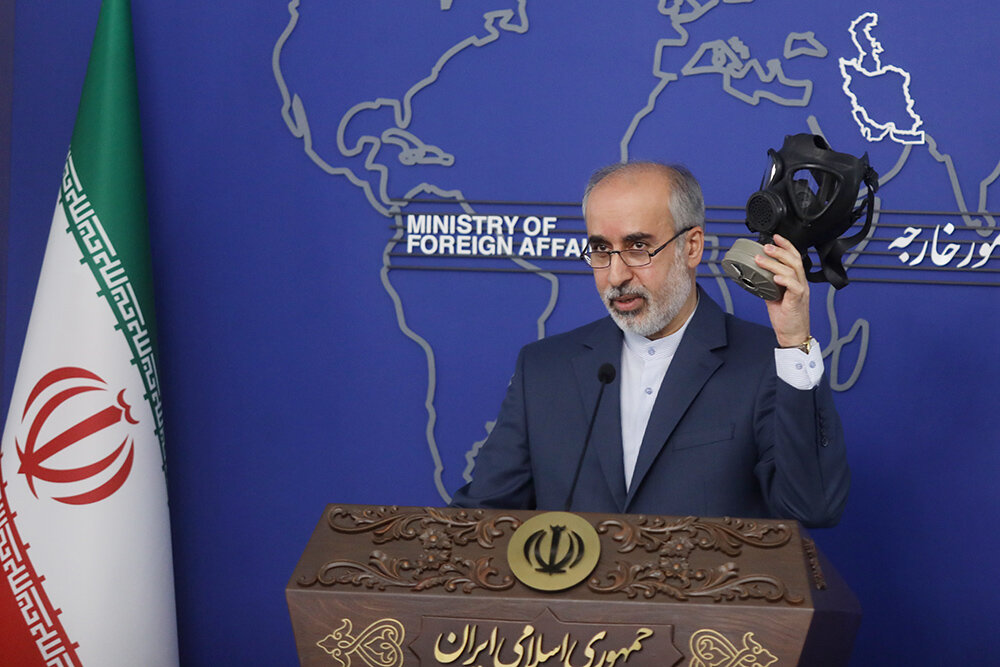Germany had vital role in arming Saddam with chemical bombs: Foreign Ministry

TEHRAN - Germany played an undeniable role in assisting Saddam Hussein by supplying the Iraqi despot with chemical weapons in the 1980s who inflicted irreparable damages on Iranian citizens and military forces, Iranian Foreign Ministry spokesman Nasser Kanaani said on Monday.
To highlight Germany's supply of chemical weapons to the Iraqi dictator during his eight-year war against Iran, Kanaani made an appearance showing a chemical mask to reporters.
“For Iranian civilians and members of our military forces, this frightening mask brings back memories. I was on the battlefronts during the Sacred Defense when I was a 16–17-year-old youngster. We carried this mask, which has a spooky aspect, in various locations, even behind the front,” he told reporters.
“Saddam's regime had no barriers in utilizing weaponry and chemical munitions throughout the conflict, which was supported by Western powers, particularly the German government,” Kanaani remarked.
Kanaani highlighted that Iran has established a national committee made up of specialists, attorneys, and official and non-official representatives to carry out national tasks and conduct in-depth investigations concerning the German provision of chemical bombs in accordance with international law.
Kanaani emphasized that a number of UN reports indicated that German firms were providing the former Iraqi tyrant with chemical weapons. Even the German news magazine Der Spiegel named Berlin as the primary supplier of WMD to the then-Baghdad government.
“Israeli oil tanker”
Regarding an attack on the Israeli oil ship off the coast of Oman, the Iranian Foreign Ministry spokesperson stated, “The Israeli regime and its other supporters want to falsely accuse Iran, and if Iran does something, it is bold enough to accept responsibility for it.”
Kanaani wished success to all members of the Iranian Navy on the occasion of the Islamic Republic of Iran Navy Day and congratulated them on their crucial task of defending the country's territorial waters.
“Human rights resolution”
Kanaani responded to a question regarding the UN human rights resolution against Iran by saying, “The statement of the Ministry of Foreign Affairs was published, and Iran will not have any collaboration with this politically-motivated body.”
According to Kanaani, “The Islamic Republic of Iran will not cooperate in any way, shape, or form with the political committee constituted in the name of a fact-finding expedition.”
In addition, he denounced the rapid application of human rights mechanisms and their instrumental use against sovereign states, stressing that such a course of action will not develop human rights.
“The Islamic Republic voluntarily performs its obligation,” he continued, adding “the actions mentioned earlier will not assist human rights.”
“Foreign meddling in unrest”
The spokesman also highlighted that there is proof the West intervened in recent turmoil in Iran to direct the events.
Kanaani told reporters that the Western embassies in Iran, particularly the U.S. interest section, were provided recorded material concerning their nations' role in the Iranian unrest.
He went on to add that a number of citizens from other countries were present during the riots, and that there was a substantial proof in this regard that was presented to their respective authorities.
Kanaani made the comments a few days after the Western nations approved a resolution in the UN Human Rights Council that called for the creation of a fact-finding team to look into the turmoil in Iran.
He furthered, “About fifty attacks on our embassies happened, including in England which has a black history of attacking our embassy in London.”
Kanaani noted that despite the nations' obligations to safeguard diplomatic posts and their staff, they did nothing to stop the politically motivated rebels from invading Iran's diplomatic facilities.
“The TV networks that have actually been converted into war chambers are headquartered in the very Western countries that claim defense for human rights,” the ministry spokesperson pointed out.
Protests erupted in Iran after Mahsa Amini, a 22-year-old woman, died in hospital on September 16. The tragic event happened three days after she was taken to a morality police in Tehran to receive training on dress code.
However, the protests turned violent as rioters burned down public buildings and ambulances, attacked mosques, etc. They launched armed assaults in a few places, among them Isfahan.
“Latest developments in the Vienna talks”
Regarding the most recent developments surrounding the Vienna talks, the spokesman noted that because Europe is affected by U.S. policies, it is unable to play an independent role.
He proceeded, “Americans show reluctance in their political positions while they continue to sending messages that the diplomatic process is the best method.”
“Military campaign against militants in Iraqi Kurdistan”
When questioned about Iraq's decision to deploy security forces in its Kurdistan region, which shares a border crossing with Iran, the spokesman stated that the Islamic Republic holds the Kurdistan region to be a part of Iraqi territory and that as a result, the Iraqi government is in charge of maintaining security for the shared borders there.”
The Islamic Revolution Guard Corps (IRGC) Ground Force recently declared that it had engaged in a number of large-scale drone and missile attacks against terrorist separatist organizations in northern Iraq's Kurdistan region.
He added the Islamic Republic is prepared to provide technical assistance to Iraq upon request.
“American side’s behavior toward flag was unlawful”
Based on the American news outlets, the U.S. Soccer Federation did alter Iran's flag on its social media to allegedly demonstrate support for Iranian “demonstrators.”
The American side agreed and remedied its error, the official added, calling such a move unlawful and immoral.
Leave a Comment